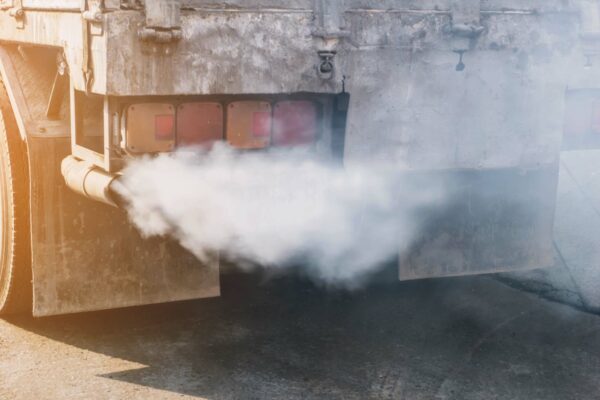What are the issues with HGV engine idling?
When your engine is running but you are not moving, it is idling. Lorries commonly idle for short and long periods of time for various reasons:
- Stuck in a traffic jam or waiting at traffic lights
- Waiting to be loaded or unloaded, or completing a trailer connection
- Waiting for the trailer airbags to charge
- Doing a pre-trip inspection (checking for air leaks, rattles, etc)
- Compulsory stops for work breaks, but needing to use the air conditioning to cool or heat the cab
- Cooling down the turbo after a challenging drive
- Using power take-off to power auxiliary equipment such as an auger
- Usual operations requiring stops, such as rubbish trucks collecting skips or bins.
In a light vehicle, it’s feasible to have engine stop/start technology, but less so in large trucks.
Long-duration idling consumes billions of litres of diesel every year. The pollution implications of this are millions of tonnes of CO2, hundreds of thousands of tonnes of NOx and thousands of tonnes of diesel particulates. Idling next to buildings affects the air quality for nearby residents – some buildings have signage prohibiting idling outside. Idling on the street affects pedestrians and cyclists by increasing air pollution. The driver and passenger are also affected by pollution, especially if there’s no wind to blow it away.

An HGV could use 700 gallons of diesel per year just idling. This affects the profit margin of the transport company. They can use over a gallon an hour while idling, depending on the rev range (when using PTO, revs are higher).
Diesel engines work more efficiently when under load and when warm. Idling creates extra wear and oil consumption, exhaust particulates and degraded performance. While it’s good practice to warm up your engine for 1-3 minutes on a cold morning, any other idling is not productive.
So, to recap, idling in a heavy vehicle:
- Accelerates engine wear
- Causes noise pollution
- Causes air pollution
- Degrades engine performance
- Burns fuel unnecessarily
Companies should have an idling policy. For example, if a truck is going to be stationary for more than a minute, it should be turned off. Check out this article for tips on how to reduce idling.
- Understanding the National Standards for Riding Mopeds and Motorcycles
- Livestock Transport Rules UK: A Complete Guide to Animal Transportation Requirements
- The Role of Safety Advisers in Dangerous Goods Transport
- Sustainable Driving: Reducing Your Environmental Impact on the Road
- Developing Effective Lesson Plans for Driver Training
- UK Agricultural Vehicle Registration and Tax Relief
- Challenges of Transporting Radioactive Materials (Class 7)
- Exemptions and support for Clean Air Zone charges
- Navigating Legal Requirements: The UK Motorcycle Licensing Rules
- Safe Transportation of Agricultural Chemicals and Hazardous Materials
- Innovations in Vehicle Construction for ADR Compliance
- Motorcycle Recovery Operations: How to Recovery a Broken Down Motorbike
- Alternative Fuels in Agricultural Vehicles
- Carriage of Dangerous Solids in Bulk Containers
- Understanding Limited Quantity Exemptions in ADR